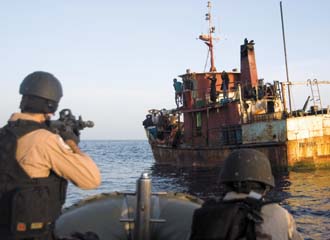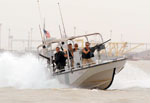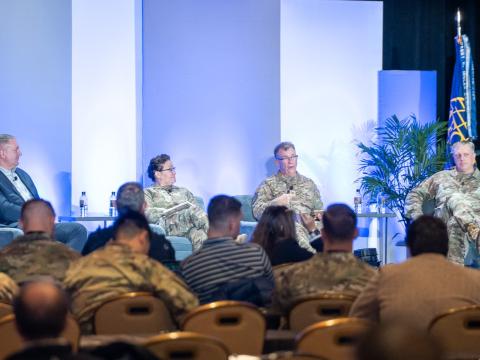U.S. Coast Guard Rides Waves of Change
 |
A U.S. Coast Guard law enforcement team joins members of the guided missile cruiser USS Gettysburg in a board, search and seizure operation of a suspected pirate vessel. |
The U.S. Coast Guard increasingly is extending its operations, often venturing far from the homeland to combat the rising tides of piracy and terrorism. While the nation’s oldest seagoing service is most known for protecting the U.S. shoreline, its homeland security as well as law enforcement and defense capabilities are in high demand, leading to debate over its appropriate role.
In years past, the Coast Guard has fallen under the purview of the Treasury Department and then the Transportation Department, and in February 2003, it officially became a part of the Department of Homeland Security. In wartime, it can be attached to the U.S. Navy. The Coast Guard also works closely with the departments of Defense and Justice, along with myriad other agencies. It is an armed force, just like the other U.S. military services, but is not a part of the Defense Department and is, therefore, exempt from the Posse Comitatus Act, which prevents the military from becoming involved in law enforcement.
While still adjusting to its new home within the Homeland Security Department, the Coast Guard is being called upon more often to participate in overseas operations. In September 2010, for example, Coast Guard law enforcement personnel took part in a military operation to recapture the motor vessel Magellan Star, a ship flying the flag of Antigua and Barbuda and owned by a German corporation known as the Dr. Peters Group, a financial services provider. The Coast Guard team was working with the 15th Marine Expeditionary Unit in support of Combined Task Force 151, a multinational, counterpiracy task force operating in the Gulf of Aden and off the eastern coast of Somalia. “The mission went down very well. The Marines conducted the initial assault on the vessel and secured the pirates. Then, the Coast Guard boarded to do the law enforcement and prosecution side of it—evidence collection and building case packages so that the marauders actually get arrested, charged and jailed,” says Cmdr. Scott Rogers, USCG, deputy chief in the Coast Guard’s Office of Counterterrorism and Defense Operations. “I find greater and greater demand to deploy internationally. What I don’t have is a consistent greater and greater supply to deploy internationally, so drawing a line between what missions we support and which ones we don’t based on resources is often a tough decision.”
The increased demand for the Coast Guard to deploy farther from home may require a national debate on the definition of homeland, according to Cmdr. Rogers. “One of the perception issues, now that we’re in the Department of Homeland Security, is how we define the homeland. Where is it in our best interest to have my Coast Guard personnel deployed internationally overseas stopping bad guys? That’s a valuable discussion.”
Cmdr. Scott argues that deploying overseas may be more expensive, but it often can be more effective. “If you stop the drugs through maritime means before they ever leave South America, it’s a whole lot easier than waiting until they get to Arizona,” he says, adding that while the debate has begun, it has not yet risen to the surface. “Defining where our homeland interests lie overseas is probably an area where more discussion and debate needs to take place in the domestic community, including Congress and the department and other places. The debate continues in pockets, but I don’t think anyone has really keyed it up as a real need to set some standards.”
The Coast Guard’s role in combating piracy includes cooperating with the international community to define best practices for preventing and countering attacks and educating commercial shippers. The Coast Guard is an active participant in the Contact Group on Piracy off the Coast of Somalia, a voluntary, ad hoc international group designed to help combat piracy in one of the world’s most dangerous regions. The group coordinates political, military and other efforts to end piracy in the area and ensure that pirates face justice.
 |
Members of U.S. Coast Guard Port Security Unit 313, based in San Pedro, California, patrol the port of Umm Quasr, Iraq. During the major combat phase of operation Iraqi Freedom, Coast Guard port security units helped maintain security in Iraqi ports and on oil terminals. |
The contact group includes four working groups. The United States leads working group three. “We are working with the international community to help work on the best management practices. These are done mostly by the international shipping companies, associations and labor groups,” explains Bob Gauvin, Coast Guard executive director of piracy policy.
In some ways the Coast Guard has become even busier since the 2009 attack on the Maersk Alabama. During that attack the captain and two crewmembers remained on the bridge while the rest of the crew locked themselves in the engine room and took control of the ship from there, rendering its bridge controls useless to the boarding pirates. “Since the attack on the Maersk Alabama, we tripled our efforts to ensure further monitoring and training,” Gauvin says.
The Coast Guard also issues a maritime security directive, which requires that all U.S.-flagged ships operating in the high-risk waters off the Horn of Africa or in the Gulf of Aden establish an anti-piracy plan, which must meet Coast Guard approval. On January 17, a U.S.-flagged ship followed Coast Guard directives to counter an attack by marauders, Cmdr. Rogers says. “An effectively prepared merchant vessel was able to avoid being boarded and being taken hostage by preparing for that part of the world they were going to,” the commander explains.
One oft-debated practice is when and how to use the ship’s automatic identification system (AIS), an automated data exchange system for identifying and tracking vessels at sea. It has been standard practice for some ships to keep the system running continuously, but that has proved dangerous, according to Cmdr. Rogers. “There is a concern that the pirates are using the AIS to find vessels to board. Some AIS systems include the ability to describe the vessel cargo, last port of call, next port of call and other information,” he says. “There are a couple of different options for turning AIS off until you need it on. It’s nice when somebody’s screaming for help if they have their AIS on so that of all those dots out there, we know which is the right dot to go help. But on the other hand, there’s sometimes a danger there.”
One of the biggest challenges in combating piracy, according to Coast Guard officials, is navigating uncertain currents of the international legal system to ensure the maritime bandits end up in jail. “Just figuring out who has jurisdiction to arrest and prosecute these folks is not always a clear-cut solution,” Cmdr. Rogers says. He cites the example of the Magellen Star. “A U.S. force working in international waters takes down pirates reportedly from Somalia on a vessel that’s flagged in Antigua and Barbuda, and owned by a German corporation. You have several entities there that could have jurisdiction. It’s not as clear-cut as it was when you could just hang them all at sea.”
In addition to fighting piracy, the Coast Guard continues to adjust to its role in combating terrorism. The Coast Guard Authorization Act of 2010, which has been signed into law by President Barack Obama, authorizes the addition of a second Maritime Security Response Team to conduct counterterrorism, anti-terrorism and force protection operations. The first team of about 250 personnel is located in Chesapeake, Virginia, with the majority of Coast Guard assets. The second team mostly likely will be located on the West Coast, according to Cmdr. Rogers.
But resources are needed before the second team is put in place. “The Authorization Act authorizes me one other team, but it doesn’t authorize the money for it,” Cmdr. Rogers says.
WEB RESOURCES
U.S. Coast Guard Piracy Homeport: http://homeport.uscg.mil/piracy
Contact Group on Piracy off the Coast of Somalia: www.fco.gov.uk/en/global-issues/conflict-prevention/piracy/
Related SIGNAL Article: www.afcea.org/signal/articles/templates/Signal_Article_Template.asp?articleid=2304&zoneid=285




Comments